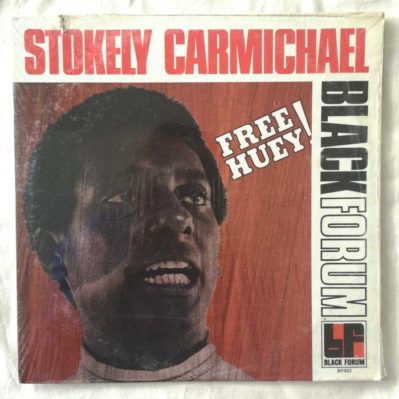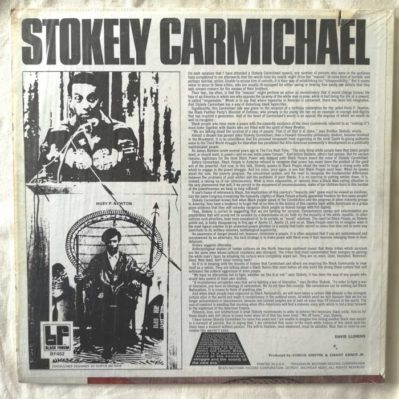In 1970 in Detroit, MI (USA), the image of Huey Newton in a rattan chair, was featured on the back-cover of the record “Free Huey” by Stokely Carmichael, published by Black Forum Records.
The black and white picture on the back side of the album designed by Curtis McNair, shows Stokeley Carmichael, giving a speech behind a lectern on which a poster of Huey Newton in a rattan chair was pasted.
The liner notes by David LLorens, states that this Carmichael talk was given on the occasion of a birthday celebration for the jailed Huey P. Newton, most probably on February 17, 1968.
Kwame Ture (born Stokely Carmichael, 1941 – 1998) was a key leader in the development of the Black Power movement, first while leading the Student Nonviolent Coordinating Committee (SNCC), then as the “Honorary Prime Minister” of the Black Panther Party (BPP), and last as a leader of the All-African People’s Revolutionary Party (A-APRP).
Curtis McNair was art director at Motown during the label’s most prolific period during the late 60’s and early 70’s (1968-1972).
“A long-playing record (2011.103.3a) recorded by Stokely Carmichael and published by Black Forum Records. The record advocates for the release of Black Panther Party founder Huey P. Newton. The album cover (2011.103.3b) features an image of Stokely Carmichael and text on the upper and right edges that reads: [Stokely Carmichael / Black Forum / Free Huey!]. (nmaahc.si.edu)
“The Black Forum label is one of a relatively extensive number of subsidiary labels created and operated by Motown Record Corporation under company founder Berry Gordys ownership. The entire collection consists of eight albums and one single, released during the years 1970 to 1973. As the Civil Rights Era cross faded into the Black Power Era, Black America’s struggle for freedom, justice, jobs and housing, and its protest against the Vietnam War, took on a greater sense of urgency, particularly after the 1968 assassination of civil rights leader Martin Luther King, Jr. Given its status as a highly successful Black-owned record company at that time, Motown was compelled to speak out on issues of critical concern to Black America. The Black Forum label provided Motown with a means of speaking out through the words of Black leaders. On Black Forum we hear the voices of Dr. Martin Luther King, Jr., Black Power activist Stokely Carmichael, poets Langston Hughes and Margaret Danner, entertainer/activist Ossie Davis, former Black Panther chairman Elaine Brown, poet and music critic Amiri Baraka, and others who played a role in shaping thoughts and actions during one of the most intense periods in American history. In this article we take a look at the Black Forum label in the context of Motowns broader engagement, through recorded sound, in social and political issues from the year 1968 through 1975. Message songs recorded by artists like the Supremes, Temptations, Marvin Gaye, Stevie Wonder and other Motown artists help make it clear that the messages of leaders heard on Black Forum are amplified in the voices of Motowns top artists. A description of each Black Forum recording is given, and each description attempts to situate the artist, audio content, and visual representation on the album cover in the sociopolitical context of the Black Power Movement and its philosophical base, Black Nationalism.” (go.gale.com)
Read a transcript of the the speech by Stokely Carmichael at the Free Huey Rally, 1968 Feb. 17 here.



















